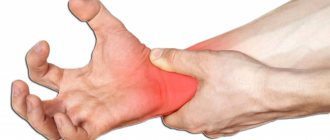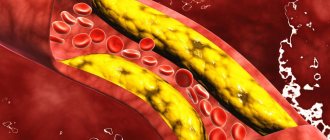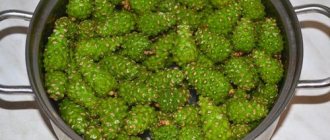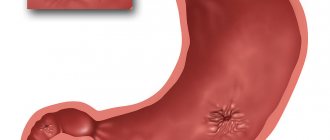Classification of bronchial asthma
There are several classifications of the disease. Depending on the causes of occurrence, the following types of bronchial asthma are distinguished:
- endogenous – attacks occur as a result of physical exertion, stress, infectious diseases;
- exogenous - asthmatic attacks are caused by the entry of allergens from the outside into the respiratory tract (dust mites, plant pollen, household dust, mold, animal hair);
- mixed – caused by the influence of both internal and external factors.
Based on severity, there are 4 stages of the disease:
- Intermittent asthma . The attacks are short-lived and occur no more than once a week. Night attacks occur no more than once every two weeks.
- Mild persistent asthma . Attacks occur more often than once a week, but no more than once a day. The patient feels weak, physical activity decreases, and sleep is disturbed.
- Moderate persistent asthma . Attacks occur almost every day. Night attacks occur more than once a week.
- Severe persistent asthma . The patient complains of daily asthma attacks, night attacks occur several times a week.
Causes of bronchial asthma
The disease is caused by the fact that under the influence of various irritants, hyperactivity of the bronchi develops, which leads to a narrowing of their lumen, swelling, and excess mucus production.
All factors that can trigger the development of asthma are divided into several groups:
- Internal factors:
- hereditary predisposition – the presence of any form of allergy or bronchial asthma in close relatives increases the risk of developing the disease;
- gender – in adulthood, asthma is more common in women; in childhood, boys are more likely to get sick;
- obesity.
- External factors(allergens):
- dust;
- pollen;
- animal hair;
- mold;
- bird feathers;
- food products (most often dairy products, chocolate, citrus fruits, fish, nuts);
- some medications (antibiotics, enzymes and a number of others)
- Triggers. These are factors that can cause bronchospasm. These include:
- ARVI;
- tobacco smoke;
- climate features (cold air, dry climate);
- bad ecology;
- regular contact of the patient with household chemicals (perfumes, powders, cleaning products).
Symptoms of bronchial asthma
The main clinical signs of the disease are:
- shortness of breath or a feeling of suffocation during physical activity or at rest - an attack develops suddenly, under the influence of provoking factors (for example, a sharp change in ambient temperature, inhalation of pollen);
- shallow breathing with prolonged exhalation;
- attacks of dry cough - the patient cannot cough for a long time, only at the end of the attack there is a slight discharge of sputum;
- whistling dry rales when breathing;
- forced characteristic posture of the patient (sitting position, legs down, hands holding the support), which facilitates exhalation.
Common symptoms that appear as asthma progresses:
- causeless weakness;
- dizziness, headaches - indicate the development of respiratory failure;
- tachycardia – observed during an attack, when the heart rate reaches 130 beats per minute; in severe asthma, rapid heartbeat is also observed in the periods between attacks;
- cyanosis of the skin and limbs - occurs in severe forms of asthma and indicates severe respiratory failure;
- a characteristic change in the shape of the nails (“watch glasses”) and phalanges of the fingers (“drumsticks”);
- signs of pulmonary emphysema - develop with severe disease;
- signs of “pulmonary heart” - in severe forms of asthma, pressure in the pulmonary circulation increases, which leads to an enlargement of the right atrium and ventricle.
Two groups of drugs for inhalation
All drugs for drug treatment of the disease are divided into two types: drugs for emergency care or relief of exacerbations and drugs for disease control (planned basic therapy). To put it very simply, we can say about most medications for asthma: those that relieve symptoms do not treat the disease itself, and those that do treat it do not help during an attack.
Emergency medications (symptomatic, to relieve symptoms).
The most effective medications for relieving symptoms (wheezing, chest tightness, and cough) are beta-2 agonists with a rapid onset of action. Despite the complex name, they are familiar to everyone: salbutamol
(aka Ventolin),
Berotek
, etc. They are able to quickly expand narrowed bronchi, so they are primarily used for acute asthma symptoms. Preference is given to drugs that are more selective, i.e. act almost exclusively on the desired type of receptors in the bronchi, and not on the heart, for example. Therefore, it is not recommended to use non-selective old drugs such as Asthmopent or Novodrin.
Anticholinergics ( atrovent
) may be used in those patients who do not tolerate beta-2 agonists.
They act more slowly (30-60 minutes until the maximum effect develops). There are combination preparations containing drugs from both of these groups ( berodual
= berotec + atrovent).
Theophylline (aminophylline)
short-acting can be used for emergency treatment, but is less effective than inhaled beta-2 agonists. In addition, undesirable effects may occur, especially in people receiving long-acting drugs in this group (for example, Teopek). In modern emergency care regimens for exacerbations, rapid-acting beta-2 agonists in an inhaler or via a nebulizer, rather than intravenous aminophylline, come first.
For severe exacerbations
use systemic hormones in tablets or intravenously in a short course. It is important that the short course is really short (3-10 days), so the dose should be sufficient to interrupt the development of an exacerbation. It is better to use a higher dose for a shorter time than a lower dose for a long time.
But you should always remember that since asthma is an inflammatory disease, simply relieving bronchospasm is not enough. In all cases, except for the mildest cases with rare and mild symptoms, anti-inflammatory therapy should be carried out. This will allow you to control the disease and avoid the development of severe exacerbations, hospitalization and the use of systemic hormones.
But you should always remember that since asthma is an inflammatory disease, simply relieving bronchospasm is not enough. In all cases, except for the mildest cases with rare and mild symptoms, anti-inflammatory therapy should be carried out. This will allow you to control the disease and avoid the development of severe exacerbations, hospitalization and the use of systemic hormones.
Diagnosis of bronchial asthma
a preliminary diagnosis based on the results of a survey and examination of the patient and the presence of characteristic clinical signs (the appearance of attacks upon contact with certain substances, wheezing and shortness of breath during exhalation, attacks of dry cough in the absence of an infectious disease).
To confirm the diagnosis and determine the severity of asthma, additional laboratory and instrumental studies are performed:
- peak flowmetry - peak activity during exhalation is determined; when it decreases, we can talk about bronchial obstruction;
- spirometry - detect bronchial obstruction;
- allergy tests - carried out to identify allergens that provoke asthma attacks and eliminate them from the patient’s life;
- identification of blood gas composition;
- ECG;
- X-ray of the lungs;
- blood test (general, biochemical);
- sputum analysis;
- studying the patient's immune status.
In addition, differential diagnosis of bronchial asthma from tumors and foreign bodies in the bronchi, obstructive bronchitis, and cardiac asthma is required.
Systemic hormones as maintenance therapy.
This should be avoided, but sometimes it happens. Sometimes it turns out that they were prescribed quite a long time ago, before the advent of modern methods of treating asthma, and the therapy simply has not been changed since then. Firstly, if the patient is taking systemic steroids, he must receive inhaled ones, and in large doses, and against this background, under the supervision of a physician, one should try to reduce the dose of systemic steroids as much as possible (ideally, remove them completely). No matter how small the dose of systemic steroids is (even a quarter of a tablet), such patients should be considered to have severe asthma. They must be carefully examined to find out why there is a need for such treatment. It often turns out that such patients continue to be in contact with their causative allergen, or do not receive inhaled hormones, or they have some other, more severe disease (not asthma). Or their inhalation technique is completely bad.
Treatment of bronchial asthma using classical medicine methods
Today, there are no universal and effective methods that would completely rid a person of asthma. The patient must constantly take hormonal medications and use special inhalers during attacks. In addition, it is necessary to follow a special diet and strictly adhere to the medication schedule.
If you follow all the recommendations of your doctor, you can significantly alleviate your general condition and improve your quality of life.
There are two main approaches to treating bronchial asthma:
- Achieving results quickly . The patient is prescribed intensive corticosteroid therapy and a course of prednisolone. The goal of therapy is to quickly relieve asthma symptoms, in particular attacks of asphyxia.
- Gradual, more gentle treatment , which is prescribed depending on the severity of the disease. If asthma symptoms worsen, the intensity of therapy increases.
Typically, improvement in the patient's condition occurs 30-60 days after the start of treatment.
general information
Bronchial asthma is a respiratory disease characterized by attacks of shortness of breath. These attacks are dangerous for the patient. They can only be stopped with medication. It should be understood that it is impossible to permanently cure bronchial asthma using folk remedies at home. Traditional methods can only be used as an addition to the main treatment.
Without medication, asthma can progress to more severe levels. The life-threatening condition is the asthmatic condition. The condition requires urgent and intensive treatment, otherwise it can be fatal. Attempts to alleviate the asthmatic condition using the methods of traditional healers are ineffective.
Treatment methods with folk remedies at home are based on the use of medicinal herbs and animal products. These methods should be used with caution and only after obtaining the consent of the attending physician, as herbs often have allergenic properties.
Folk remedies for the treatment and prevention of bronchial asthma
Bronchial asthma is very difficult to treat with medications, which can cause serious side effects if taken regularly. Therefore, many patients decide to resort to folk remedies, which, like traditional ones, are aimed at reducing the severity of the symptoms of this insidious disease. Traditional methods help relieve severe asthma attacks and prevent relapses in the future.
A simple way to relieve the condition during the next attack of bronchial asthma
To relieve attacks, you can drink 1-2 tbsp. water, and then put a pinch of salt on your tongue. Salt is an antihistamine that will relieve constriction and microspasms of the bronchi and help clear the lungs of sputum and mucus clots. This effective method, which relieves asthma attacks and treats asthma, helps with cystic fibrosis and emphysema. The effect of salt is the same as that of an inhaler, and the plus is that it is non-toxic.
Breathing exercises according to Strelnikova
By regularly performing the exercises developed by Strelnikova, breathing will become easy and free, bronchospasm will be relieved, the immune system and tone of the respiratory system will be strengthened, and blood flow will improve.
Treatment of asthma with traditional recipes
Mix the following ingredients in equal proportions:
- potato juice;
- honey;
- aloe juice with pulp;
- black radish juice;
- vodka.
Place the mixture in a dark place for 3 days, shaking occasionally. Take 3 rubles. per day 1 tbsp. If you are allergic to honey, it can be replaced with sugar. This method relieves acute symptoms for one and a half to two years.
Oregano for asthma attacks
Acts as an expectorant and diaphoretic. 2 tsp crushed oregano herb is poured with a glass of boiling water. They insist for half an hour. Drink 3 times a day, half an hour before meals, 1/3 cup.
Oats for asthma
Mix 0.5 liters of water and 2 liters of milk, bring to a boil, add oats and simmer over low heat with the lid closed. This makes approximately 2 liters of decoction. Add 1 tsp to 150 ml of decoction. butter and honey, drink hot. You need to take this decoction for at least one year. The broth is stored in the refrigerator.
2 tbsp. Peel and rinse the oats, then pour 2 liters of boiling water and cook, stirring constantly over low heat. After an hour, add 0.5 liters of goat milk and cook for another 30 minutes. Drink 30 minutes before meals, 0.5 cups warm or hot with the addition of 1 tablespoon of honey.
1 tbsp. pour 1 tbsp of unpeeled (with husks) oats crushed in a coffee grinder. boiling water and leave for two hours.
Pour 0.5 tbsp into a thermos. oatmeal pour 1 liter of boiled water. Take after straining with the addition of 1 tbsp. onion juice after meals.
Ginger for asthma
- Alcohol tincture . Grate 300 g of fresh ginger root, place in a glass container and pour in 0.5 liters of vodka or alcohol. Keep warm for 10 days. Strain and take 2 r. per day 1 tsp. Drink with warm boiled water or milk. The course is 1 month with a break of 2 weeks.
- Ginger root decoction . Grate dried ginger root 4-5 cm long and add cold water. Place in a water bath until it boils. Cover with a lid and cook for 20 minutes. Then wait until it cools down with the lid closed. Drink 0.5 cups before meals, preheated. Can be added to tea.
- Ginger juice . Squeeze 30 grams of juice, mix with a pinch of salt. You can drink it before bed by mixing 1 tbsp. juice with honey. Then drink water or herbal tea.
Other folk remedies
- Garlic oil . Grind the garlic (5 large cloves) and mix it with salt and butter (100 g). Can be added to mashed potatoes or spread on bread.
- A decoction of wild rosemary . 1 tbsp. pour a glass of boiling water over the herbs and boil for 10 minutes. Drink 5-6 times a day, 1 tbsp.
- A decoction of elecampane roots . Mix elecampane with honey, 100 g each and pour in 3 liters of whey, put in the oven, after boiling, reduce the temperature and keep in the oven for 4 hours. During the course of treatment, do not use all the prepared broth. Drink 3 r. per day 1 tbsp.
- Hydrogen peroxide . Dilute 30 drops of peroxide in 0.5 tbsp. water. Consume 30 minutes before meals.
Salt cave, halotherapy, salt lamp
Halotherapy and a salt lamp, unlike salt inhalations, do not provoke bronchospasm and sputum production.
A salt lamp releases negative ions, purifies the air, and reduces the concentration of mold and microorganisms.
Mullein
What you will need: 5 g of crushed flowers.
How to take: place in a glass and add boiling water. It is necessary to insist. Take 1/3 or ½ cup of warm infusion 2-3 times a day.
Bedrenets
What you will need: 10.0 chopped roots.
How to take: place the roots in a container and add 2 glasses of water, boil. Then you need to leave for 4 hours at room temperature. Take 0.5 cups – 3-4 times a day.
Badger fat
The use of badger fat has long been known for respiratory diseases, including bronchial asthma. Badger fat stores many useful substances it needs to survive. It is for this reason that badger fat is considered beneficial. In small quantities there are almost no contraindications. However, it is better not to use it when treating children, pregnant and lactating women.
It should be remembered that, like any product, fat can cause an allergic reaction, so use it with caution.
Treatment of bronchial asthma with folk remedies is not always effective. Badger fat can relieve cough a little and reduce chest pain due to its warming effect.
It can be used internally, but is more often used as a lotion. To do this you need: Heat a tablespoon of fat at room temperature, this is enough for it to melt.
- Apply the product to your hand and rub it with light massaging movements over the entire surface of the chest, except for the heart area.
- After this, the patient should be covered with a warm blanket.
Prevention of bronchial asthma
To prevent the occurrence or development of complications, primary and secondary prevention are necessary. People with a family predisposition, smokers, allergy sufferers, as well as people involved in hazardous work are at risk and should take the following preventive measures:
- compliance with basic hygiene rules;
- maintaining cleanliness in the place of residence, regular ventilation and wet cleaning of the premises;
- giving up bad habits (especially smoking);
- if you have allergies, obstructive bronchitis, or chronic respiratory diseases, it is important to treat them in a timely manner and, if possible, eliminate contact with allergens;
- use of personal protective equipment when working in hazardous industries;
- try to use household chemicals to a minimum (preferably they are hypoallergenic);
- proper nutrition, eating only high-quality, healthy, hypoallergenic foods;
- do not abuse air fresheners, perfumes, deodorants;
- do not self-medicate, take medications only as prescribed by the attending physician, in the dosages indicated by him;
- timely treatment of various somatic diseases;
- regular sanitation of foci of chronic infection in the body;
- avoiding stress;
- hardening the body, strengthening the immune system;
- physical activity - walking, physical education;
- Regular preventive examinations will help diagnose bronchial asthma at an early stage, which will significantly facilitate subsequent treatment and improve the prognosis.







